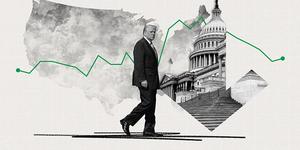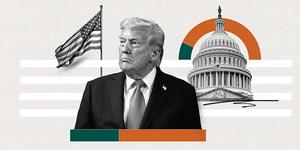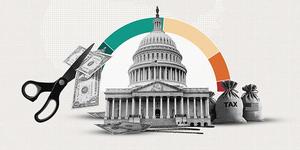Politics
Explore Gallup's research.

Venezuela experienced some of the highest levels of financial insecurity in Latin America last year, as well as widespread disapproval of leadership and distrust in elections.

Americans expect a difficult 2026, expressing pessimism about most economic, political and global matters — with the stock market a notable exception.

Eight decades of polling offers important lessons about the kinds of healthcare reforms Americans are willing to support.

Americans usher out 2025 with low approval of their leaders, worsening economic views, and sharp partisan divides after the shutdown.

Roughly four in 10 U.S. adults — equivalent to nearly 110 million Americans — doubt Medicare and Social Security will be available in 10 years, and a majority say benefit changes worry them more this year than last year.

Americans' approval of the Affordable Care Act has risen to a new high, fueled by increased support among political independents.

Larger majorities than in 2011 say Republicans (69%) and Democrats (60%) go too far in using inflammatory language to criticize their opponents.

Although most Americans are united in rejecting political violence, a notable minority say it is "sometimes OK."

President Donald Trump's job approval rating has slipped to a new second-term low point and is approaching his all-time low of 34%.

Americans' ratings of the seriousness of crime nationally continue to be much more negative than their perceptions of crime at home.

A Kettering Foundation/Gallup survey finds most Americans support political compromise, view multiculturalism as a strength and reject political violence.

Trust in the federal government has declined in recent decades, mostly vanishing among those who do not support the president's party.

Americans generally view the U.S. prison system as secure, but say it is ineffective at keeping inmates safe or rehabilitating them.

Two years after expressing record pessimism about the U.S. illegal drug problem, Americans are the most optimistic they have been in a quarter century.

Americans as a whole favor addressing the root causes of crime over boosting law enforcement, and they oppose using military force in U.S. cities, but partisans' views strongly differ.

Fewer Americans see national or local crime rising or view these as serious problems, but concerns about child safety and financial fraud remain.

Congress' approval rating has sunk to 15%, mainly because of a sharp decline among Republicans.

Americans rate the Republican and Democratic parties similarly, but their reasons for liking or disliking each party vary greatly.

Americans continue to express a desire for a third party but have reservations about voting for third-party candidates.

Americans favor spending cuts over tax hikes to reduce the deficit, although a majority of U.S. adults support taxing the wealthy to raise revenue.